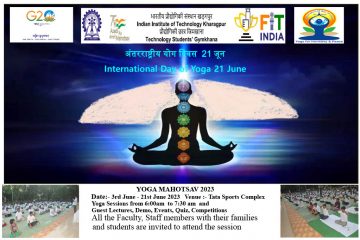IIT Kharagpur’s Centre for Classical Arts will transform the way the classical arts are taught and preserved
A new dream is unfolding in IIT Kharagpur. The premier technology institute is working towards the creation of a Centre for Classical Arts.
As to why an institute specializing in science and technology should ramify into the arts, the big picture first. For a variety of socio-economic reasons, the traditional guru-sishya parampara through which many of India’s intangible art forms have been passed down through generations is unlikely to survive in the future. There is a dire need to evolve a modern pedagogy of teaching and learning the traditional art forms so that they continue to be appreciated, practiced, researched and improvised upon. IIT Kharagpur believes that this can be made possible through appropriate technological interventions that can make the teaching-learning experience interesting and innovative, while at the same time preserving the core fundamentals of the traditional art forms.

There is another concern closer to heart — the students. Professor Joy Sen, head of the department, Architecture and Regional Planning, who is already knee-deep into heritage preservation as part of IIT Kharagpur’s SandHI (Science and Heritage Initiative) team, says, a course in music will be a “small infill in the lives of new entrants who are entering the rat race.” While they engage in analysis, logic, deep maths, computer programming and such like, music and the classical arts will give them a chance to contemplate, listen and appreciate.
Professor Pallab Dasgupta, Dean, Sponsored Research and Industrial Consultancy and leading professor of computer science and engineering says, “Since our musical heritage is more about innovation, engagement with it gives a cognitive satisfaction to minds that are intelligent and creative,” he says. Professor Dasgupta, much like Professor Sen, is a driving force behind the proposed Center of Classical Arts. But while it is important to rejuvenate interest in classical arts among students through the process of teaching-learning, appreciation and innovation, “the goal is to preserve our heritage,” says Dr Dasgupta.

This thought process goes back several years. The Society for the Promotion of Indian Classical Music And Culture Amongst Youth or SPIC MACAY was founded by an IITKGP alumnus, Kiran Seth, whose work has been an inspiration for Arjun Malhotra, co-founder of HCL and another noted alumnus, who has taken up the cudgels for the creation of the arts center in IITKGP. Says Mr Malhotra, “We have been thinking about the impact SPIC MACAY has had on our youth and we wanted to leave a perpetual legacy for our classical art and music and culture to continue. That was the motivation behind SandHI”
The institute already has ongoing collaboration in the areas of music and fine arts, notable among which is a recent tie up with Pandit Ajoy Chakraborty and his school of classical music for children, called Shrutinandan.
This first-of-its-kind Center for Classical Arts will consist of three main components. One, an educational center for students that will create a teaching-learning experience uniquely crafted with the help of modern technology. The educational center will offer training in music, fine arts and the performing arts, and also introduce credit courses in the forms of electives and micro-specializations.

Two, the school will create national and international outreach programs for dissemination and collaborative research on science and technology interventions in Indian classical music and other classical arts.
Three, it will create teaching-learning resources for Indian classical music and other classical arts. This is a huge challenge given the fact that traditional pedagogy of Indian classical music is anchored on direct dissemination from teacher to student, without reference to any archived content.
The team working on the founding of the Center of Classical Arts understands the challenge they have taken up. Says Mr Malhotra, “The challenge for IIT Kharagpur is that there is so much to do in this area… what would they (the arts school) focus on initially and how would they expand this. Just in music alone there are so many gharanas… and then there is folk music.”
Besides, enormous resources are required for this initiative. The institute is looking forward to public-private partnerships, support from its alumni, music enthusiasts and the government funding to give wings to its mission.




It is a great initiative. Arts are highest form of science (and engg). All engg semesters 1 thru 8 must have at least one arts appreciation minor course. By the time a student passes out of the institute she/he should know all forms of arts and must have developed a love for at least one form. Engg stimulates the left brain, art will stimulate the right. This way future engineers will not only find themselves equipped to find SOLUTIONS but also will know to deal with stress and strains of the practical world. They will benefit immensely by staying healthy keeping stress related illness at bay. Knowing, appreciating and practising arts have huge benefits, the merit of which is lost to the education system in India